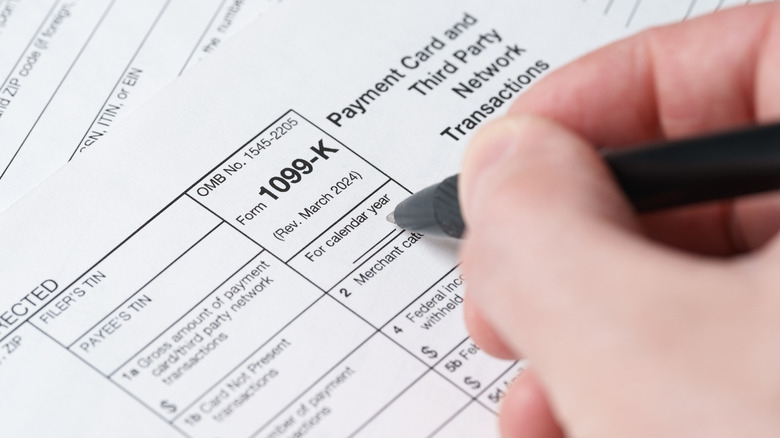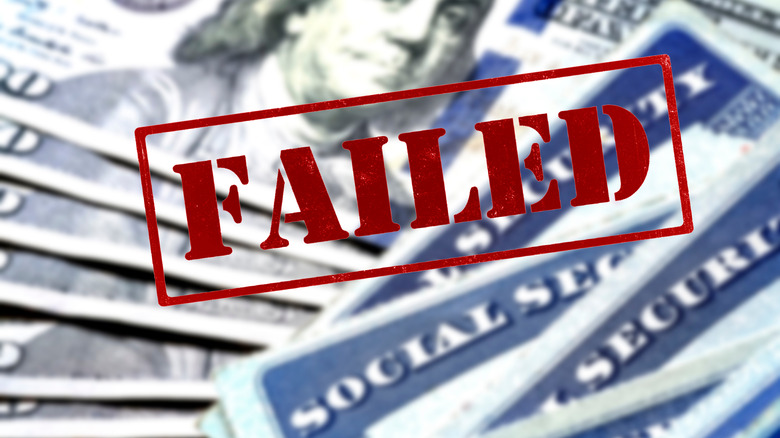11 Red Flags That Could Increase Your Risk Of An IRS Audit
IRS audits can be so nerve-wracking that, according to the tax agency, 62% of Americans avoid cheating Uncle Sam on their taxes just to steer clear of them. But what can happen if the IRS audits you? Well, if you've done everything right and the odds are in your favor, the revenue service could resolve your case within just a few weeks (via Debt.org).
However, if the IRS finds discrepancies in your tax returns, it may adjust them, send you another tax bill, or investigate you further. And if the agency concludes that you attempted to evade paying your taxes (based on the evidence it finds), it can slap you with a hefty penalty ranging from $100,000 to $500,000, depending on whether you're an individual or organization. Even worse, you could end up spending "up to five years" behind bars, according to The W Tax Group.
Evidently, you have plenty of valid reasons to fear IRS audits. In the fiscal year 2024, the revenue service audited roughly 505,514 taxpayers, and it may target even more in 2025. To be on the safe side, familiarize yourself with these 11 common red flags that can increase your risk of an audit and steer clear of them.
Your business expenses are higher than usual
It's impossible to accurately predict how high or low your business expenses will be during a particular tax year, but you can take it to the bank that the IRS will flag your returns for an audit if you report an abnormally large amount, per U.S. News. This could be based on factors like your competitors' income or the deductions you claimed during previous years.
According to tax expert Brittany Benson, one way to prevent the IRS from singling you out for an audit is to "separate your business and personal expenses." Maintain two different bank accounts or credit cards. You can use one to pay for household bills, such as utilities and groceries, and the other for business expenses. Then, note everything down to avoid any confusion. That way, when the IRS shows up at your doorstep, you have all the proof you need to convince the agency that you didn't combine your business and personal expenses.
You misreported your business income
Another IRS audit trigger is misreporting your business income. Perhaps you sold stocks and neglected to include them in your tax returns, or some of your customers paid using virtual currencies, and you forgot to mention that. The big question is, how can the IRS possibly know that you reported only a portion of your business earnings? The revenue service has an Automated Underreporter (AUR) system that enables it to access data from "third parties" like banks and spot inconsistencies in your reported income.
The IRS may also know when you're trying to dodge paying taxes through its Whistleblower Program, which allows people to rat on business owners who fail to report all of their income. In return, the revenue service awards the whistleblowers, who could be your competitors or disgruntled current or former employees, 15%-30% of the amount it recovers as long as the money exceeds $2 million. If you don't want the IRS to put you in the hot seat, ensure your tax return shows the entirety of your business income.
You gave questionably large amounts to charity
Qualified charitable distributions are among the lesser-known ways to boost tax refunds, so, according to CNBC, you can be sure the IRS will become suspicious if you're a little too benevolent. For example, let's say you have $80,000 in your retirement account. Donating $50,000 to a charitable organization doesn't add up — the IRS will undoubtedly want to know more, which might see them audit your tax returns.
To play it safe when giving out money to charity, preserve receipts for each donation, no matter how big or small. Does this apply to non-cash donations as well? According to WCG CPAs & Advisors, you should obtain written acknowledgement to prove that you made the donation you're claiming, whether the item was worth as little as $250 or more than $5,000. But of course, this can be a bit hard to pull off if, for instance, you leave it at the doorstep of a particular charity organization without letting anyone know, as per the website. In that case, the IRS may let you off the hook if you don't provide proof of your non-cash donation worth at most $250.
You make losses every year
If you're running a business, there's a possibility that you'll make losses for several years in a row, and when that happens, you'll likely pique the IRS' curiosity and trigger an audit. This is not uncommon, given that declining revenue is one of the reasons up to 49.4% of businesses close up shop by the end of their fifth year, according to Key Marketing Strategies. Unfortunately, it doesn't mean the IRS will cut you some slack. Instead, the revenue service may wonder if you're operating your business as a leisure pursuit or to make a profit.
Unless you want to risk an audit, maintain proper documentation that leaves no doubt that you're in business for the money, despite your consistent losses. Demonstrating that you're an expert in your field and having strategies to boost revenue can also convince the IRS you're not just trying to benefit from business deductions, as the former chairperson of the IRS Advisory Council (IRSAC), Annette Nellen, recommends.
You claimed the earned income tax credit
A large chunk of Americans claim the Earned Income Tax Credit (EITC) to supplement their low incomes, but usually end up being audited. In March 2022, Thomson Reuters reported that between 35% and 45% of all IRS mail audits are EITC audits, as per research done by the National Bureau of Economic Research (NBER). Why does the IRS tend to probe into tax returns claiming EITC? According to CNBC, it's simply because many taxpayers take advantage of the refundable tax credit. And this is actually not surprising, as EITC is one of the ways taxpayers use to enjoy bigger tax refunds.
Claiming EITC is a complicated process for most taxpayers. The easiest way to minimize your risk of an audit is to see to it that you satisfy all the IRS' requirements for this particular credit. These range from being "a resident alien" or an "American citizen" to having a "valid" SSN that renders you eligible for employment in the United States. Also, bear in mind that filing Form 2555, which allows you to get the Foreign Earned Income Exclusion, disqualifies you from claiming EITC.
You're making good money
Nothing feels better than making more money, right? Unfortunately, this could be the same thing that puts you on the list of taxpayers to be audited by the IRS. According to TurboTax, your risk of an audit is much higher if you make over $200,000. This is part of the revenue service's move "to restore fairness in tax compliance," as the former IRS commissioner, Danny Werfel, shared in a statement in 2023.
A couple of years ago, the IRS was known for auditing more low-income earners than wealthier taxpayers. As per data from TRAC, the rate at which the "poorest" Americans making $25,000 or less were audited during the fiscal year 2021 was 5X higher than that of other Americans. Statistics from the same website show that this trend continued in the fiscal year 2022, when the IRS audited over 20,000 more "poorest wage earners" than the previous year.
You provided the wrong Social Security Number
While selecting the wrong filing status can cost you money, filing under the wrong Social Security Number (SSN) could do something even worse: Trigger an IRS audit (via U.S. News). That's in a worst-case scenario, though. If entering the incorrect SSN doesn't lead to an audit, it may prompt the IRS to reject your tax return until you correct it and delay your refund, as Joanne Burke, the founder of Birch Street Financial Advisors, a wealth management firm, confirms (via Investopedia).
"One major impact is delayed processing and refunds. If critical information, such as income, filing status, or Social Security numbers, is entered incorrectly, the IRS may take additional time to review the return and resolve discrepancies, which could hold up any refund you're expecting," Burke said.
Note that using the wrong SSN is just one of the mistakes you should avoid when filing your tax returns. Another common blunder that could result in an audit is making math errors in your tax returns, whether by including estimated figures or miscalculations. If you want to err on the side of caution, consider software like TurboTax or H&R Block, but don't forget to learn the advantages and disadvantages of each before choosing one of them.
You claimed large rental real estate losses
As unbelievable as it might sound, significant real estate losses make you an IRS audit target because it could mean you didn't calculate your deductions correctly or you're trying to fool Uncle Sam. Usually, the revenue service requires you to report every dime earned from your rental properties and deduct the expenses incurred from your total income. Applicable expenses in this case include repairs that don't add to the value of the property as well as the building's depreciation. Payments made to employees, such as maintenance staff and property managers, are on that list, too.
That said, if you're not a real estate professional but actively participate in managing your property, you can lawfully deduct losses of up to $25,000, according to the IRS. Keep in mind that you must check other boxes to be eligible for this deduction, including earning a maximum modified adjusted gross income (MAGI) of $100,000 or less. Still, claiming rental losses exceeding $25,000 doesn't automatically translate into an audit. It only increases the chances of the IRS putting your tax return under the microscope.
You only use your car for business operations
So, let's assume you only have one vehicle. Claiming that you only use it for business operations attracts the IRS's attention because it likely doesn't hold water. Chances are, you use the car for personal stuff as well, such as driving to your favorite restaurant for lunch with your friends or heading out of town for a weekend getaway. To avoid putting yourself on the IRS' radar, make sure to deduct only the cost of its business use, as the IRS advises.
And that's not the end of it. You must avoid common pitfalls when claiming your car deductions. MileIQ suggests recording and reporting all your business drives as well as the reasons behind them. Additionally, the tech company proposes understanding the standard mileage rates, as they can help you determine the deductible costs of using your ride for business purposes. And this is recommended for both business owners and employers since the IRS can still audit you if you drive an employer-provided vehicle.
Your lifestyle and income don't match
The IRS uses "an Information Return Processing (IRP) analysis" and "a financial status analysis" to conduct a lifestyle audit, which helps the agency figure out whether your reported income is enough to sustain your spending habits. This could be based on your area of residence or recent purchases and activities. For example, claiming to earn $30,000 annually and then paying for a $120,000 Tesla in cash doesn't make sense at all. The same applies to a taxpayer who says they make $15,000 annually but still manages to go for multiple vacations throughout the year.
During a lifestyle audit, the IRS compares your W-2 (wages) and 1099 (income from other sources other than employment) forms with your individual tax returns. It's not unusual for the revenue service officials to tour your business, check your credit history, and monitor your bank deposits, too, to ensure your spending habits and earnings match. If there's even the slightest hint that you understated your taxable income, harbor no doubt that the IRS will pay you a visit, though not immediately. The revenue service may take some time to target you after it notices red flags in your tax returns following a lifestyle audit.
You claimed the home office deduction
Claiming the home office deduction on Schedule C (Form 1040) might seem like a nice idea since it allows you to deduct part of your home office expenses, such as rent and utilities, and potentially save a few bucks. Plus, who doesn't want a tax break? Unfortunately, if you don't meet the requirements set by the IRS, you could be the next target of an audit.
According to the IRS, you're only eligible for the home office deduction if you're a self-employed entrepreneur or freelance partner who uses your home as a "principal place of business." This means your customers or clients stop by often to access your products or services, and your office is not located in a separate structure near or next to your primary residence. Note that running a daycare facility at your house or renting out part of it also falls under this category.
Of course, qualifying for the home office deduction is not always enough to stop the IRS from coming after you. Calculating the deduction correctly plays a big role in avoiding the scrutiny of the revenue service. The IRS recommends using the simplified method, which is based on your home office space. This option allows you to deduct $5 for every square foot, and the maximum area you can claim is 300 square feet. Alternatively, maintain accurate records of your home office expenses.











